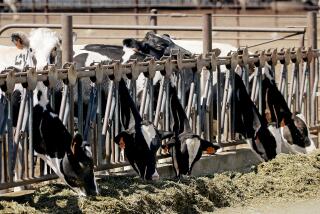Millions Spent to Halt Development : Massachusetts Acts to Save Dairy Farms
- Share via
SPRINGFIELD, Mass. — While the federal government and property developers are paying dairy farmers to go out of business, Massachusetts is spending millions of dollars to try to save its dairy farms.
“It’s not an easy thing to do, but we are just not going to roll over and let our dairy farms go away,” said state Agriculture Commissioner August Schumacher.
“Dairying is one of the industries most dominated by federal governmental policy, and that policy has, by and large, been contrary to Massachusetts’ interests.”
The difference is that, although there is a heavy surplus of milk nationally, Massachusetts’ production has dropped to the point where its ability to keep stores supplied during storms and other transportation emergencies is threatened, he said.
Development Rights
The keystone of a seven-point program the department is putting together to bolster Massachusetts dairy farms is the state’s Agriculture Preservation Restriction program. Since 1977, the state has spent $45 million to buy the development rights to about 17,000 acres of farmland.
Under the program, the farmer retains ownership and the state pays for easements designating land permanently for agricultural use. To determine the value of development rights, the state makes two assessments and pays the difference between the property’s valuation as farmland and its valuation as development land.
“The strategy is that dairying is the major user of agricultural land in the state and it is under heavy development pressure,” Schumacher said.
Connecticut, Rhode Island, Vermont and Maryland have similar programs, said Robert Wagner of the American Farm Land Trust. A bond issue referendum is scheduled for this November to finance a similar program in Pennsylvania. There are also some county-sponsored programs in North Carolina, Pennsylvania and Washington state, he said.
High-Tech Belt
In Massachusetts, Worcester County, on the fringes of the state’s high-tech belt, has 142 commercial dairy farms, more than any other county.
About half of the farms in the preservation program “are dairy farms and they will continue to be dairy farms,” Schumacher said. “If the Legislature approves the additional $30 million we have requested, we will be able to save another 100 farms over the next five to six years.” The allocation, approved by the state House, is pending in the Senate.
Various federal plans to reduce milk surpluses and cut production, plus the demand for land for housing development in Massachusetts, have combined to take a heavy toll on the state’s farms.
A decade ago, Massachusetts had 914 dairy farms. Now it has 545, a drop of 40%, said Dave Sheldon, chief of the state dairy bureau.
During the last year, he said, 31 farms have ceased production altogether and 66 others have participated in a federal buyout program that began in April and concludes this September. That program cut the state’s milk production by nearly 20%, he said.
90% Imported
Massachusetts now imports more than 90% of its milk, he said.
“If there is a hurricane, a blizzard or the bridges are out, we can’t afford to be bringing in all our milk from western New York and northern Vermont,” Schumacher said. “For food security reasons we must have at least 10% to 15% of the supply within the state.
“During Hurricane Gloria, the first thing everyone did was go to their supermarket to stock up on milk,” he said. “The response of the distributors was great, but they were running their trucks day and night, making double pickups at the farms, just to try to keep the shelves stocked.”
More to Read
Sign up for Essential California
The most important California stories and recommendations in your inbox every morning.
You may occasionally receive promotional content from the Los Angeles Times.













